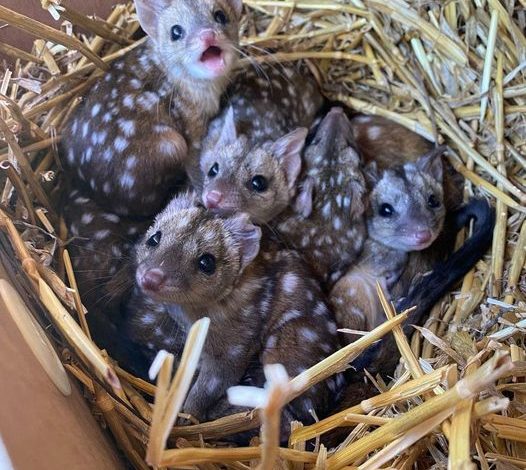Gang Finds Unusually Spiky Creatures In Nest – Takes A Closer Look And Jaws Drop When They Realize What Kind Of Animals They Are.

here is new hope for a species that was almost gone forever.
A team of scientists in Australia is really excited because their work to help this species grow has worked out well.
Recently, ecologists at the Mt Gibson Wildlife Sanctuary in Australia made an amazing find.
In the sanctuary, they discovered a group of tiny, spiky newborn animals.

These creatures are really special. They are called “western quolls,” which are a unique kind of carnivorous marsupial.
In the past, these animals were found all over Australia, but ever since Europeans started settling there, their numbers have dropped a lot.
Today, western quolls, also known as chuditchs, are only located in the southwestern part of Australia, and they exist in small groups.
This type of marsupial is about the size of a cat and is important for the environment. They help keep the populations of smaller invertebrates, some reptiles, and birds in check.
New hope..
Recently, scientists have been trying to bring back marsupials to the Mt Gibson Wildlife Sanctuary, a place where they used to live but disappeared.
Now, with the exciting news of baby marsupials being found, it looks like the scientists have done a great job. The animals are doing well and are able to have babies without any problems.
“Through regular monitoring, we can see the quolls are doing well at the sanctuary and encountering the first pouch young is a positive sign that they have adjusted to the new environment,” Georgina Anderson, who is a Senior Field Ecologist at AWC, mentioned.
“One quoll that we’ve named Aang is a regular at camera traps we set up at the release sites. He is one of our largest and most striking quolls with a personality to match – often making rounds of multiple sites to collect the chicken we use as lures and disrupting our bait canisters,” she added.
It’s so exciting to see that there’s hope for the species! I really hope it can start to flourish all over Australia again soon!
You can share this article on Facebook to spread the good news!